A mental experiment: What if the Sun disappeared?
(Edited)
Hello Hivers,
When I was working as a researcher at the university, a friend of mine organized in a local pub in the city where I worked, i.e. Forlì, some evening events in which a theme was chosen and someone who was specialized in that particular topic explained it to the others. On one of these evenings, it was my turn to talk about the Sun, since my research project at the time consisted of understanding the effects that our Star had on radio frequency communications in deep space missions.
So I decided to try a thought experiment:
Quando lavoravo come ricercatore all'università, una mia amica organizzava in un pub locale della città in cui lavoravo, i.e. Forlì, delle serate in cui sceglieva un tema e qualcuno che era specializzato in quel determinato argomento lo spiegava gli altri. In una di queste serate, è toccato a me parlare del Sole, visto che il mio progetto di ricerca all'epoca consisteva nel capire gli effetti che la nostra stella aveva sulle comunicazioni in Radio Frequenza nele missioni nello spazio profondo.
Così ho deciso di provare a fare un esperimento mentale.
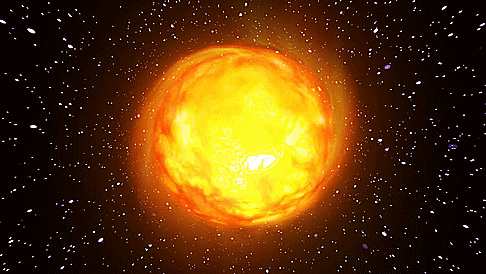
Source
Obviously it is a very unlikely circumstance since the sun will die in a few billion years, expanding dramatically and incorporating the other planets including the earth. Obviously it will not simply disappear because (from what we know) matter does not simply disappear but transforms into something else. Despite this, it seems to me a very interesting mental exercise to try to imagine what would happen if the sun were to suddenly disappear.
Ovviamente è una circostanza alqunto improbabile poiché il sole morirà tra qualche miliardo di anni ingrandendosi a dismisura e inglobando gli altri pianeti tra cui la terra. Ovviamente non scomparirá nel nulla perché la materia (per quello che ne sappiamo) non scompare semplicemente ma si trasforma in qualcos'altro. Nonostante questo, mi sembra un esercizio mentale molto interessante provare ad immaginare cosa accadrebbe se appunto il sole dovesse improvvisamente scomparire.
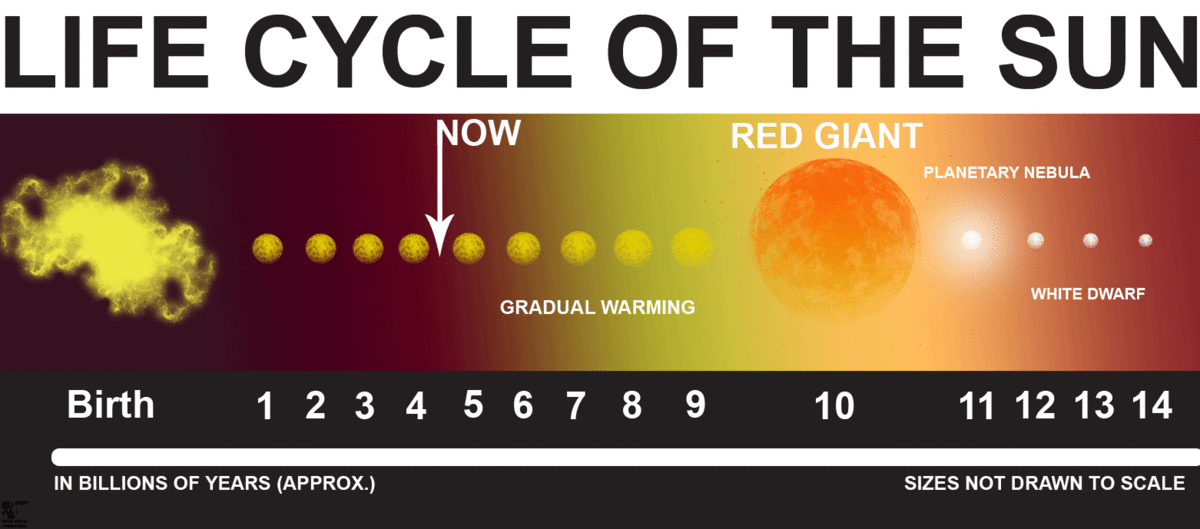
Source
As Einstein showed us, gravity is a property of all bodies that have mass, so we ourselves, in primis, exert a certain force of gravity on all other bodies around us. Obviously this force depends on two fundamental parameters: body mass and distance. The force of gravitational attraction is directly proportional to the mass of the bodies and inversely proportional to the square of the distance, this explains why the only force of gravity we feel is that of the Earth that attracts us towards itself (and we are not instead attracted towards the Sun which has a mass much greater than that of our planet). The Sun is very important in all of this as it is itself the largest body within our solar system, and is therefore the one that holds the other planets together and makes them orbit around itself.
Come ci ha dimostrato Einstein, la gravità è una proprietà di tutti i corpi che hanno una massa, quindi anche noi stessi esercitiamo una determinata forza di gravità su tutti gli altri corpi che sono attorno a noi. Ovviamente questa forza dipende da due paramentri fondamentali: massa del corpo e distanza. La forza di attrazione gravitazionale è direttamente proporzionale alla massa dei corpi e inversamente proporzionale al quadrato della distaanza, questo spiega perché l'unica forza di gravità che sentiamo è quella della Terra che ci attira verso di se (e non siamo invece attirati verso il Sole che ha una massa di gran lunga più grande rispetto a quella del nstro pianeta). II Sole in tutto ciò è molto importante poiché è a sua volta è il corpo di dimensioni più grandi all'interno del nostro sistema solare, ed è quindi quello che tiene insieme gli altri pianeti e li fa orbitare attorno a sé stesso.

Source
So let's start thinking about what could happen if the sun suddenly disappeared:
Cominciamo quindi a ragionare su cosa potrebbe accadere se il sole improvvisamente scomparisse:
The first point to address is that if the sun were to disappear, we would not notice it instantly, since as we all know, light travels at a finite speed and in particular that of the Sun takes about 8 minutes and 20 seconds to reach Earth.
Il primo punto da affrontare è che se il sole dovesse scomparire, noi non ce ne accorgeremmo istantaneamente, poiché come ben sappiamo la luce viaggia ad una velocità finita e in particolare quella del sole impiega circa 8 minuti e 20 secondi per arrivare sulla Terra.
I would dwell on this detail for a moment, because it is one of those that has always fascinated me. The main implication due to the fact that light has a finite speed, is that when we look at in the sky, what we see is nothing more than a afterimage of reality (although I don't know how much sense it makes to use this term. ). To try to simplify this concept even more, one can say that when we look at the sky we are actually looking at the past . Fascinating isn't it? Many of the stars we see in the sky could have exploded billions of years ago and we still don't know.
Scientists have exploited this concept to try to understand how was our Universe during his first stages, sending probes to the edges of our solar system with powerful telescopes that allowed us to look at planets and stars at such a distance from our planet that they could be considered at the dawn of creation of the Universe.
Do you want to know a fun fact ? There is a limit beyond which we cannot look into the past... obviously in order to look, we need light, and the theoretical limit beyond which we cannot observe is precisely when the light was released in the early stages of the birth of our Universe. I don't know about you, but talking about these things gives me goosebumps 🤯.
Mi soffermerei un attimo su questo dettaglio, perché è uno di quelli che mi ha sempre affascinato. L'implicazione principale del fatto che la luce ha una velocità finita è il fatto che quello che noi guardiamo nel cielo non è altro che una immagine residua della realtà (anche se non so quanto abbia senso usare questo termine), per farla ancora più semplice quando noi guardiamo il cielo in realtà stiamo guardando il passato. Affascinante vero? Molte delle stelle che noi vediamo in cielo potrebbero essere esplose miliardi di anni fa e noi ancora non lo sappiamo.
Gli scenziati hanno sfruttato questo concetto per provare a capire cosa è successo durante le prie fasi di vita del nostro Universo, mandando sonde ai confini del nostro sistema solare con potenti telescopi che ci hanno permesso di guardare pianeti e stelle ad una distanza tale dal nostro pianeta da poterli considerare agli albori della creazione dell'Universo.
Volete sapere un fun fact? Esiste un limite oltre il quale non possiamo guardare nel passato... ovviamente per poter guardare, abbiamo bisogno di luce, e il limite teorico oltre il quale non possiamo osservare è appunto quando la luce è stata liberata nelle prime fasi della nascita del nostro Universo. Non so voi, ma a me parlare di queste cose mette la pelle d'oca 🤯.
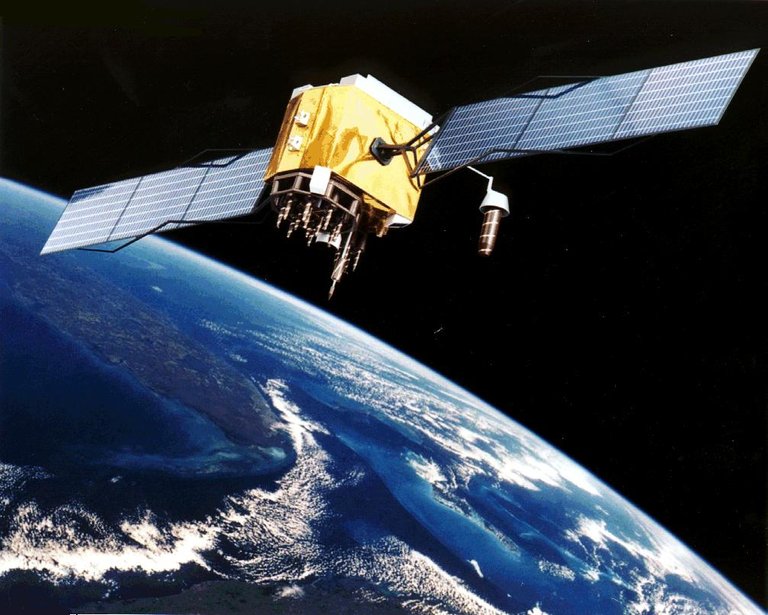
Source
But let's get back to our main topic, since we're digressing a bit.
We were saying that if the Sun were to disappear, we will instantly not notice it but the light would fail on the earth about 8 minutes and 20 seconds after the disappearance of the sun itself. The same applies to the gravitational force that the sun exerts on our planet, since it too moves at a speed equal to that of light. So in the same instant in which we will see the light of the sun disappear, we will also immediately stop feeling the force of gravity that the Sun exerts. Our planet would immediately begin to move in space with a speed equal to that it had at the exact moment in which the force of gravity disappeared and with a direction tangent to the point of the orbit in which it was at that moment. We will then be essentially launched into space without following our elliptical orbit anymore. Obviously, the other planets that are at greater distances than us, such as Jupiter or Saturn for example, would continue their motion for a time equal to the time it takes for light and gravity to reach them.
Ma torniamo al nostro argomento principale, visto che stiamo un po' divagando.
Stavamo dicendo che se il Sole dovesse scomparire, noi istantaneamente non ce ne accorgeremo ma la luce verrebbe a mancare sulla terra circa 8 minuti e 20 secondi dopo la scomparsa del sole stesso. Analogo discorso averrebbe anche per la forza gravitazionale che il sole esercita sul nostro pianeta, dato che anch'essa si muove ad una velocità uguale a quella della luce. Quindi nello stesso istante in cui vedremo la luce del sole scomparire, immediatamente sentiremo anche venir meno la forza di gravità che il Sole esercita, e il nostro pianeta comincerebbe immediatamente a muoversi nello spazio con una velocità pari a quella che aveva nel momento esatto in cui è scomparsa la forza di gravità è una direzione tangente al punto dell'orbita in cui si trovava il nostro pianeta in quel momento. Verremo quindi sostanzialmente lanciati nello spazio senza più seguire la nostra orbita ellittica. Ovviamente gli altri pianeti che si trovano a delle distanze più grandi rispetto noi come Giove o Saturno per esempio, continuerebbero il loro moto in un tempo pari a quello che impiega la luce e la forza di gravità a raggiungerli.
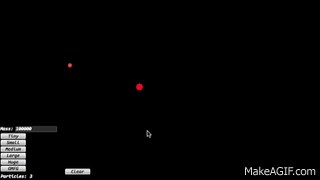
On earth, obviously, sources of energy that do not depend on the sun would continue to function, but a big problem would be that of chlorophyll photosynthesis , which cannot in any way happen without sunlight. Without photosynthesis, plants would no longer have a way to convert carbon dioxide into oxygen. Fortunately, the oxygen reserves on our planet are so large that even without plants to produce more, we could still survive for a considerable amount of time.
Sulla terra ovviamente le fonti di energia che non dipendono dal sole continuerebbero a funzionare, ma un grosso problema sarebbe quello della fotosintesi clorofilliana, che senza la luce del sole non può in alcun modo avvenire. Senza la fotosintesi, le piante non avrebbero più modo di convertire l'anidride carbonica in ossigeno. Fortunatamente, le riserve di ossigeno sul nostro pianeta sono così grandi che anche senza le piante a produrne dell'ulteriore, potremmo sopravvivere lo stesso per un considerevole lasso di tempo.

Source
One of the biggest problems caused by the disappearance of the sun would be the natural cooling of our planet, since without the supply of heat that is constantly radiated by our star, our planet would begin to exponentially release the accumulated heat, at a very high rate initially, to then slowly settle on lower values. In a short time, 0 ° C would be reached. Obviously this is not such an anomalous situation for some parts of the earth, so probably for the first period, part of the population would be able to survive. However, after a few months, the situation would begin to be more delicate and the average temperatures on earth would begin to drop dramatically, reaching unsustainable levels. Obviously at these temperatures the only way to survive would be to go to geothermal areas such as Yellowstone park (which is nothing more than a huge volcano that could explode sooner or later 😅) or Iceland, where the heat comes from the center of the earth itself.
Uno dei problemi più grandi causato dalla scomparsa del sole sarebbe il naturale raffreddamento del nostro pianeta, dato che senza la scorta di calore che viene irradiato costantemente dalla nostra Stella, il nostro pianeta comincerebbe a rilasciare esponenzialmente il calore accumulato, con un ritmo quindi molto elevato inizialmente, per poi piano piano assestarsi su dei valori più bassi. Nel giro di poco tempo si raggiungerebbero gli 0°C. Ovviamente questa non è una situazione così anomala per alcune parti della terra, quindi probabilmente per i primi periodi parte della popolazione riuscirebbe a sopravvivere. Passati però alcuni mesi, la situazione comincerebbe ad essere più delicata e le temperature medie sulla terra comincerebbero a scendere vertiginosamente, raggiungendo temperature insostenibili. Ovviamente a queste temperature l'unico modo per poter sopravvivere sarebbe quello di recarsi in zone geotermali come il parco di Yellowstone (che altri non è che un enorme vulcano che potrebbe anche esplodere prima o poi 😅) o l'Islanda, dov'è il calore deriva dal centro della terra stesso.
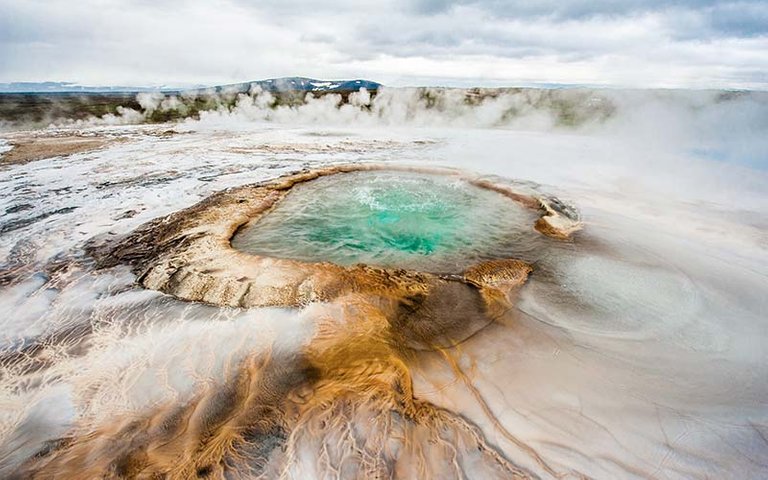
Source
Such a significant drop in temperatures would then cause freezing of all oceans . This would be a big advantage for all those creatures that live in water, since being the ice less dense than the water itself, it would begin to float on the surface and being an excellent thermal insulator it would allow the underlying water to maintain an acceptable temperature for a quite a long time. This same phenomenon usually happens during the winter when temperatures drop below zero degrees, and that's exactly how marine creatures survive.
Un abbassamento così importante delle temperature provocherebbe poi il ghiacciamento di tutti gli oceani. Questo sarebbe un grosso vantaggio per tutte quelle creature che vivono in acqua, poiché essendo il ghiaccio meno denso dell'acqua stessa, esso comincerebbe a galleggiare sulla superficie ed essendo un ottimo isolante termico permetterebbe all'acqua sottostante di conservare una temperatura accettabile per un periodo abbastanza importante. Questo stesso fenomeno accade normalemnte durante l'inverno quando le temperature scendono sotto gli zero gradi , ed è così appunto che le creature marine sopravvivono.
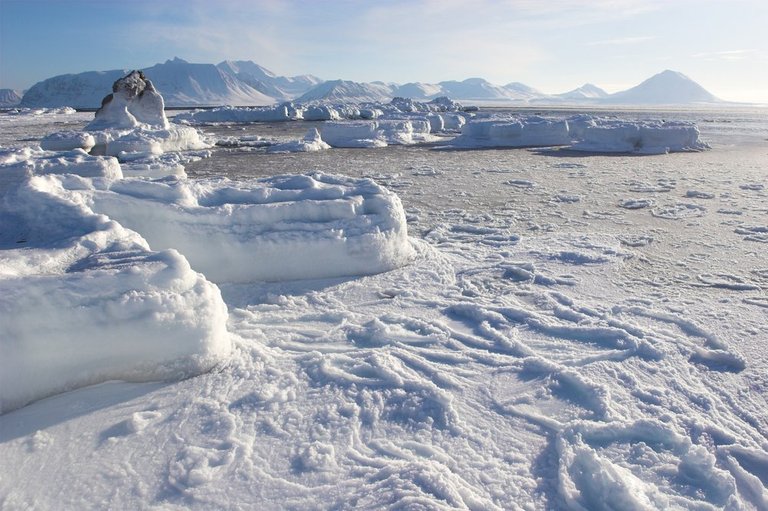
Source
So, as previously said after the disappearance of the gravitational attraction of the Sun, the Earth would start moving tangentially to the direction of the orbit it had at that moment and would begin to travel around the universe with a fairly important speed, transporting life forms within it. In the event that during its journey it does not impact against any celestial body, it could continue its journey even for thousands / millions of years going in the direction of other galaxies and other solar systems and why not, perhaps being attracted to a new Sun and starting to orbit around it.
The most incredible thing in my opinion of all this talk, is that even without the Sun, life on earth would still have some chance of continuing, obviously only in the depths of the oceans, while there would be no hope for human beings.
Quindi, come detto precedentemente dopo la scomparsa dell' attrazione gravitazionale del Sole, la Terra partirebbe tangenzialmente alla direzione del orbita che aveva in quel istante e comincerebbe a viaggiare per l'universo con una velocità abbastanza importante, trasportando al suo interno delle forme di vita. Nel caso in cui durante il suo tragitto non dovesse impattare contro nessun corpo celeste, potrebbe continuare il suo cammino anche per migliaia/milioni di anni andando in direzione di altre galassie e di altri sistemi solari e perché no, magari venendo attratto da un nuovo sole e cominciando ad orbitare intorno ad esso.
La cosa più incredibile secondo me di tutto questo discorso è che anche senza il Sole, la vita sulla terra avrebbe comunque qualche possibilità di continuare, ovviamente soltanto nelle profondità degli oceani, mentre non ci sarebbero speranze per gli esseri umani.
Conclusions/Conclusioni
Obviously as I said in the beginning, this was a purely exercise of imagination and reasoning, since the disappearance of the Sun is a highly unlikely event. I don't deliberately use the term impossible, because physics has shown us over and over again that what we think impossible may actually simply be something we don't understand yet. The most striking example in this case, besides Einstein's theory of relativity, is the uncertainty principle introduced by quantum mechanics, which defines the state of an electron in terms of probability (which upsets all our beliefs). Maybe in the next post I could try to address this topic in more detail.
Ovviamente come ho detto all'inizio questo è stato un esercizio puramente di immaginazione e ragionamento, visto che la scomparsa del Sole è un evento altamente improbabile. Non uso volutamente il termine impossibile, perchè la fisica ci ha dimostrato più è più volte che quello che riteniamo impossibile in realtà potrebbe semplicemente essere qualcosa che ancora non comprendiamo. L'esempio più lampante in questo caso oltre alla teoria della relatività di Einstein, è il principio di indeterminazione introdotto dalla meccanica quantistica, che definisce lo stato di un elettrone in termini di probabilità (cosa che sconvolge tutte le nostre convinzioni). Magari nel prossimo post potrei provare ad affrontare questo argomento più nel dettaglio.

0
0
0.000
Questo è un post spettacolare @aurzeq!
Adesso me lo leggo con molta calma 😊
Mamma mia, mi ha fatto venire la pelle d'oca questo post! Davvero bellissimo, complimenti!!!
Grazie @will91, mi fa molto piacere che ti sia piaciuto 😊
@stefano.massari guarda questo post! Questa è la qualità che io mi aspetterei dai post del web 3.0 e in particolare da #Hive!
Cosa ne pensi?
Post molto bello! Davvero i complimenti
Dear @aurzeq,
The current HiveBuzz proposal will expire in a few days.
Do you mind supporting our proposal for 2022 so our team can continue its work next year?
You can do it on Peakd, ecency, Hive.blog or using HiveSigner.
https://peakd.com/me/proposals/199
Thank you. We wish you a Happy New Year!
Interessante questo post dove la Terra senza Sole si muoverebbe… rimarebbero solo la vita nell’acqua. Come disse non ricordo chi, anche l’uomo è un elemento marino, se non ci fosse l’acqua non esisterebbe… ma la tua teoria dice che l’uomo ha bisogno anche del sole. Comunque… grazie per questo post sul Sole. Il Sole verrà fortemente rivalutato in questo decennio, verrà visto da molti come veniva visto da Tesla 120 anni fa.
Yay! 🤗
Your content has been boosted with Ecency Points, by @aurzeq.
Use Ecency daily to boost your growth on platform!
Support Ecency
Vote for new Proposal
Delegate HP and earn more
Congratulations @aurzeq! You received a personal badge!
Wait until the end of Power Up Day to find out the size of your Power-Bee.
May the Hive Power be with you!
You can view your badges on your board and compare yourself to others in the Ranking
Check out the last post from @hivebuzz:
Support the HiveBuzz project. Vote for our proposal!
Congratulations @aurzeq!
You raised your level and are now a Minnow!
Check out the last post from @hivebuzz:
Support the HiveBuzz project. Vote for our proposal!